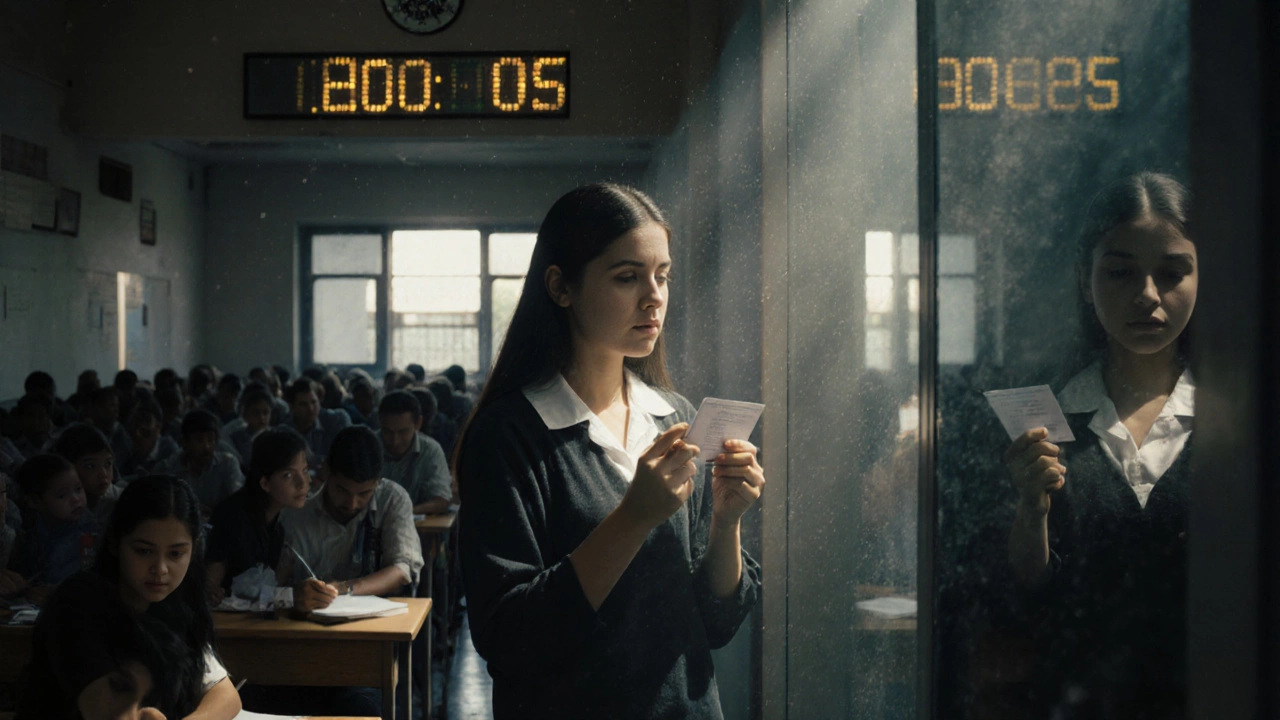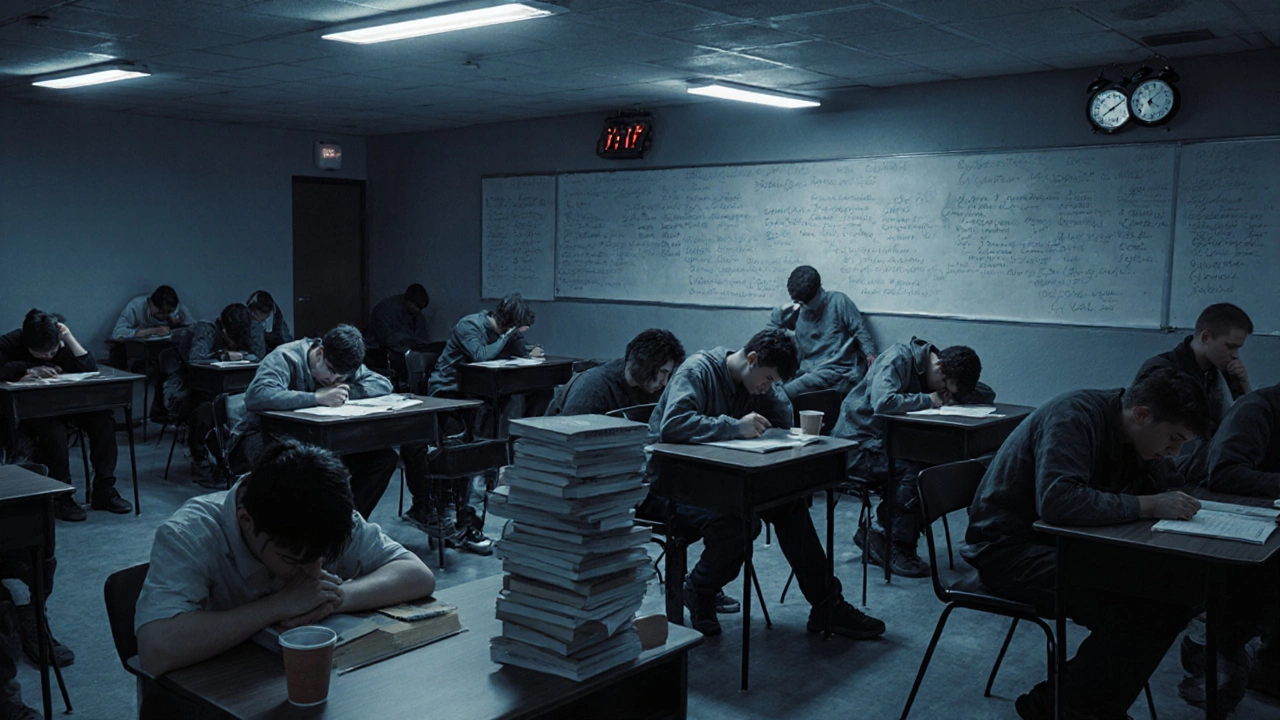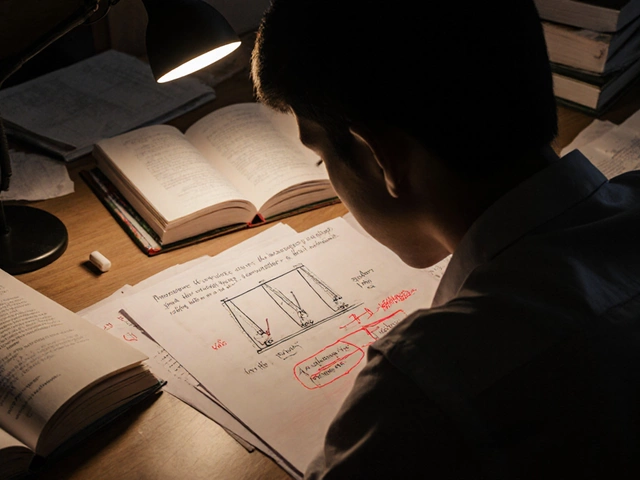Exam Stress Comparison Tool
Which Exam Has the Highest Stress Factor?
Compare key metrics that determine stress levels for India's most competitive entrance exams.
IIT JEE
India's engineering entrance exam to top colleges like IIT Bombay and Delhi
NEET
India's medical entrance exam for all medical colleges
UPSC
India's civil services exam for government jobs
Understanding the Stress Factors
These exams differ in their stress profiles. NEET has the highest percentage of students reporting severe anxiety, IIT JEE has the most extreme social pressure, and UPSC has the longest preparation period with the most significant financial burden.
Key Insight: All three exams have success rates below 5%, with less than 1% of candidates ultimately succeeding. This scarcity creates extreme pressure on students.
There’s a quiet moment just before the exam hall doors open. Your heart is pounding. Your palms are sweaty. You’ve studied for 16 hours a day for two years. And you know-only 1% of people walking in here will pass. This isn’t a scene from a movie. It’s real life for hundreds of thousands of students in India, China, South Korea, and beyond. The question isn’t whether a degree is hard-it’s which path breaks people the fastest.
The Real Cost of Getting Into IIT JEE
When people ask about the most stressful degree, they’re really asking: Which entrance exam destroys your mental health before you even start college? For millions, the answer is IIT JEE. This single exam decides if you get into India’s top engineering schools-places like IIT Bombay or IIT Delhi. Less than 10,000 out of 1.5 million candidates make it each year. That’s a 0.6% success rate.
Students begin preparing as early as age 12. Coaching centers run 12-hour days. Weekend breaks are rare. Sleep is sacrificed. Many students lose friends, hobbies, and even family connections. A 2023 study by the Indian Journal of Psychological Medicine found that 68% of IIT JEE aspirants showed symptoms of moderate to severe anxiety. One in five reported suicidal thoughts. And this isn’t about being weak-it’s about a system built on extreme scarcity.
Success isn’t just about grades. It’s about surviving the pressure. Parents invest life savings. Siblings are compared. Failure isn’t seen as a setback-it’s seen as shame. The exam doesn’t test knowledge alone. It tests endurance. And the stress doesn’t end when you get in. Once enrolled, the dropout rate in IITs hits 20% in the first year-not because students can’t handle the coursework, but because they’ve already burned out.
NEET: The Medical Exam That Feeds on Hope
If IIT JEE is brutal, NEET is relentless. This is the gatekeeper to every medical college in India. One exam. One chance. No retakes for a year. Over 2.3 million students sit for it every year. Only 80,000 get seats. That’s a 3.5% success rate.
Unlike engineering, where you can switch to IT or data science if you fail, medicine leaves little room for Plan B. You can’t become a doctor without clearing NEET. So families mortgage homes. Students drop out of school to study full-time. Some live in coaching hostels for five years straight. One student in Chennai told reporters he hadn’t seen his mother’s face in three years-she visited once, just to drop off groceries.
Medical aspirants face a unique kind of pressure. They’re not just competing for seats-they’re competing for dignity. In many towns, the local doctor’s son is expected to clear NEET. If he doesn’t, the family is whispered about. Girls are told they’re wasting their time. Boys are told they’re disappointing their lineage. The emotional toll is heavier than the syllabus.
And here’s the cruel twist: even if you clear NEET, you’re not done. You still need to get into a government college to afford the fees. Private medical colleges cost up to ₹80 lakh ($9,500 USD) per year. Most families can’t pay. So you’re stuck in a cycle: study harder, hope harder, suffer harder.
UPSC: The Longest Road to a Job
Then there’s UPSC-the civil services exam. It’s not about getting into college. It’s about getting a government job that gives you power, stability, and respect. But it’s also the longest, most grinding path of all.
The exam has three stages: Prelims, Mains, and Interview. It takes most candidates 3 to 5 attempts to clear it. The average age of an IAS officer when they finally get selected? 28. That means many start preparing at 21-and spend half their twenties in a single exam cycle.
Unlike IIT JEE or NEET, UPSC doesn’t have coaching centers that guarantee results. You’re on your own. You read 15+ books. You write 20 essays a month. You memorize constitutional articles, economic policies, international treaties. You give up relationships. You skip birthdays. You watch friends move abroad, get promotions, buy cars-and you’re still stuck with your notes and a half-eaten packet of biscuits at 3 a.m.
And the numbers don’t lie. Only 700 out of 1.1 million applicants get selected each year. That’s a 0.06% success rate. The stress isn’t just about failing-it’s about the years of silence. No one celebrates when you clear Prelims. No one asks how you’re doing after your third failure. The world moves on. You don’t.

Why These Exams Are Worse Than College
People think college is hard. But college is a journey. You have professors, clubs, friends, breaks, second chances. These exams? They’re sieves. They filter you out before you even begin.
Here’s what makes them uniquely stressful:
- No safety nets-One exam decides your future. No retakes. No backups.
- Social pressure-Your entire community watches. Failure is a family shame.
- Financial ruin-Families spend everything. Many go into debt.
- Isolation-You can’t afford to socialize. You can’t afford to fail.
- No clear finish line-Even if you pass, you’re not done. You still have to get into a good college, afford it, and survive it.
Compare that to a typical university degree. In the U.S., Canada, or Europe, you can switch majors. You can take a gap year. You can fail a class and retake it. There’s room to breathe. In these systems, there’s no air.
What Happens After You ‘Succeed’?
Let’s say you beat the odds. You got into IIT. You cleared NEET. You became an IAS officer. What now?
Many survivors say the real trauma starts after the win.
At IIT, you’re surrounded by people who also survived hell. The competition doesn’t stop. Grades still matter. Internships are cutthroat. You’re told you’re the best-but you’re terrified you’re not good enough.
Medical students in India work 80-hour weeks. They’re on call every third night. They see death daily. And they’re expected to smile while doing it.
And IAS officers? They’re thrown into corrupt systems. They’re expected to fix problems they didn’t create. They’re praised publicly but punished privately. Many break down in their 30s.
The system doesn’t reward resilience. It consumes it.

Is There Another Way?
Yes-but it’s not easy to believe.
Some students are walking away. They’re choosing private universities abroad. They’re switching to vocational paths-digital marketing, cybersecurity, UX design. They’re learning skills that pay well without needing a 5-year exam grind.
In South Africa, where I live, the pressure isn’t the same. You don’t need to pass one exam to get into university. You need a matric pass, and then you apply. It’s not perfect. But it’s human.
Change is slow. But it’s happening. More parents are asking: “Is this worth it?” More students are saying: “I don’t want to die for a degree.”
Maybe the most stressful degree isn’t the one you study. It’s the one you’re forced to chase.
Is IIT JEE the most stressful exam in the world?
IIT JEE is one of the most stressful, but not necessarily the most stressful overall. It competes with NEET and UPSC in India, and with South Korea’s CSAT or China’s Gaokao globally. What makes IIT JEE uniquely brutal is the combination of extreme competition (0.6% success rate), early start age (12+), and the cultural expectation that success equals worth. Many students spend 2-4 years in coaching centers with no social life, no hobbies, and no mental health support.
Why is NEET more stressful than other medical entrance exams?
NEET is more stressful because it’s the only gateway to medicine in India. Unlike in the U.S. or UK, where you can apply to multiple schools with different criteria, NEET is a single-point failure system. One exam. One shot. No second chances for a year. Plus, there’s a huge gap between the number of aspirants and available seats-only 3.5% get in. Families invest everything. Students are told their entire future depends on this one day. The emotional weight is unmatched.
How long do students typically prepare for UPSC?
Most UPSC aspirants prepare for 3 to 5 years before clearing the exam. Many start right after college, around age 21-22, and don’t get selected until they’re 26-28. The exam has three stages, and failing any one means starting over. The syllabus covers everything from history and economics to international relations and ethics. It’s not just about memorizing facts-it’s about writing analytical essays under time pressure, every single day, for years.
Do students who clear these exams suffer long-term mental health effects?
Yes. Studies show high rates of anxiety, depression, and PTSD among successful candidates. A 2022 survey of IIT students found that 41% still experienced panic attacks after admission. Many report feeling empty after achieving their goal. The pressure doesn’t vanish-it shifts. You’re now expected to be perfect. And if you’re not, you feel like a fraud. Mental health services in these institutions are often underfunded or stigmatized.
Are there alternatives to these high-pressure exams?
Absolutely. Many students are now choosing international universities, vocational training, or private sector careers in tech, design, and entrepreneurship. Countries like Germany, Canada, and Australia offer affordable, high-quality education without single-exam gatekeeping. Online certifications in coding, digital marketing, or data analysis can lead to well-paying jobs without needing to clear a 10-year exam marathon. The stigma around these paths is fading-especially among Gen Z.
What Should You Do If You’re Caught in This System?
If you’re preparing for one of these exams, here’s what actually helps:
- Set a time limit-Decide now: “I’ll try for two years. If I don’t make it, I move on.”
- Protect your sleep-You can’t study if you’re exhausted. Aim for 6 hours minimum.
- Find one person to talk to-A friend, a counselor, even a Reddit group. Don’t isolate.
- Know your worth isn’t tied to this exam-You are not your score.
- Have a Plan B-Look at alternatives now. Don’t wait until you fail.
The system will try to convince you that sacrifice equals virtue. It doesn’t. Resilience isn’t about grinding yourself into dust. It’s about knowing when to walk away-and having the courage to choose life over a title.




